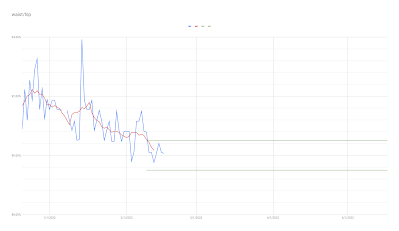I did not have a very well-thought-out maintenance plan, the last couple times I got to my goal: just a fairly vague idea that I would "level out" by adding some calories back in. Exactly how many calories, and how I would pace myself on them, I didn't specify, so naturally what happened was that I just eased the restraints a bit, and what naturally happened after that was a period of binge-eating. Just as revolutions tend to break out when conditions are getting better, bingeing tends to happen when my calorie allowances are increased. The urge to break out of restraints is stronger when those restraints are loosened.
It didn't help that my graphs were all weight-loss graphs, not weight-maintenance graphs. They weren't well adapted to visualizing what I wanted to visualize. These things matter, for me.
So the new graph is this one here:
The thing being measured here is my waist measurement divided by my hip measurement, expressed as a percentage. The blue line is a three-day rolling average, and the red line is an eight-day rolling average; and the object of the game is to keep the red line "inside the box," that is, in between the two green lines, which mark out 89.5% and 90.5%. The plan is to keep my current regimen until the red line bashes into the bottom of the box, probably in about a month, and then to add a daily hundred calories, so as to spend a month wandering back up until it bashes into the top. Then reduce calories again, and repeat, indefinitely. (One of the things to be discovered is roughly how many calories it takes to "change direction.")
I mulled over other plans, but I think I like this best. I don't want to be "changing direction" daily or even weekly. Plus I suspect that it will be easier to build and retain muscle if I have weeks-long periods of mild calorie- and protein-surplus, alternating with weeks-long periods of mild calorie- and protein-deficit. I used to envision a steady state, a stable weight that stayed within a couple pounds of some number or other. I no longer think that would be necessarily desirable -- or an easy state to attain. Things shift too much: demands and stresses alter. I need a dynamic system that accommodates them. I hope this plan will be easier, and more flexible without entailing more decision fatigue.
